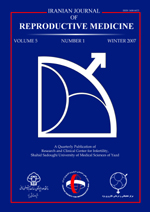
|
International Journal of Reproductive BioMedicine
Research and Clinical Center for Infertility, Shahid Sadoughi University of Medical Sciences of Yazd
ISSN: 1680-6433
EISSN: 1680-6433
Vol. 16, No. 5, 2018, pp. 299-304
|
 Bioline Code: rm18033
Bioline Code: rm18033
Full paper language: English
Document type: Research Article
Document available free of charge
|
|
|
International Journal of Reproductive BioMedicine, Vol. 16, No. 5, 2018, pp. 299-304
| en |
Granulocyte-colony stimulating factor may improve pregnancy outcome in patients with history of unexplained recurrent implantation failure: An RCT
Arefi, Soheila; Fazeli, Elham; Esfahani, Manijeh; Borhani, Nasim; Yamini, Nazila; Hosseini, Ahmad & Farifteh, Fattaneh
Abstract
Background: Family of colony-stimulating factors (CSF) have an essential role on
early cross talk between embryo and uterine endometrium.
Objective: The aim of this study was to evaluate the effects of the single dose of
Granulocyte-CSF (G-CSF) injection on clinical outcome of assisted reproductive
technology cycle in patients with repeated implantation failures.
Materials and Methods: This randomized control trial study was performed on 52
infertile women who referred to the clinic with the history of more than three
previous In vitro fertilization/Intracytoplasmic sperm injection-embryo transfer
failures. All patients were stimulated with standard long protocol. All embryos were
transferred on day five in blastocyst stage in both groups. The treated group received
300 μg (0.5 ml) recombinant human G-CSF subcutaneously which was injected 30
min before blastocyst embryo transfer.
Results: There was not statistically significant differences in abortion rate in G-CSF
and control group (p=0.09). G-CSF treated group showed higher clinical pregnancy
rate in comparison with control group (56.2% vs. 40.0%) but it was not statistically
significant (p=0.09). Although live birth rate in G-CSF group was higher than
control group (53.1% vs. 35.0%) but there wasn’t statistically significant difference
in the overall live birth rate between the two groups (p=0.10). G-CSF group had a
twin pregnancies while in control group there was no twin pregnancy.
Conclusion: Our result demonstrates the possibility that pregnancy outcome is
better in women with repeated unexplained In vitro fertilization failure who are
treated with G-CSF.
Keywords
Granulocyte colony-stimulating factor; Embryo implantation; Pregnancy rates; Assisted reproductive technology; Randomized controlled trial.
|
| |
© Copyright 2018 - International Journal of Reproductive BioMedicine
Alternative site location: http://www.ijrm.ir
|
|
